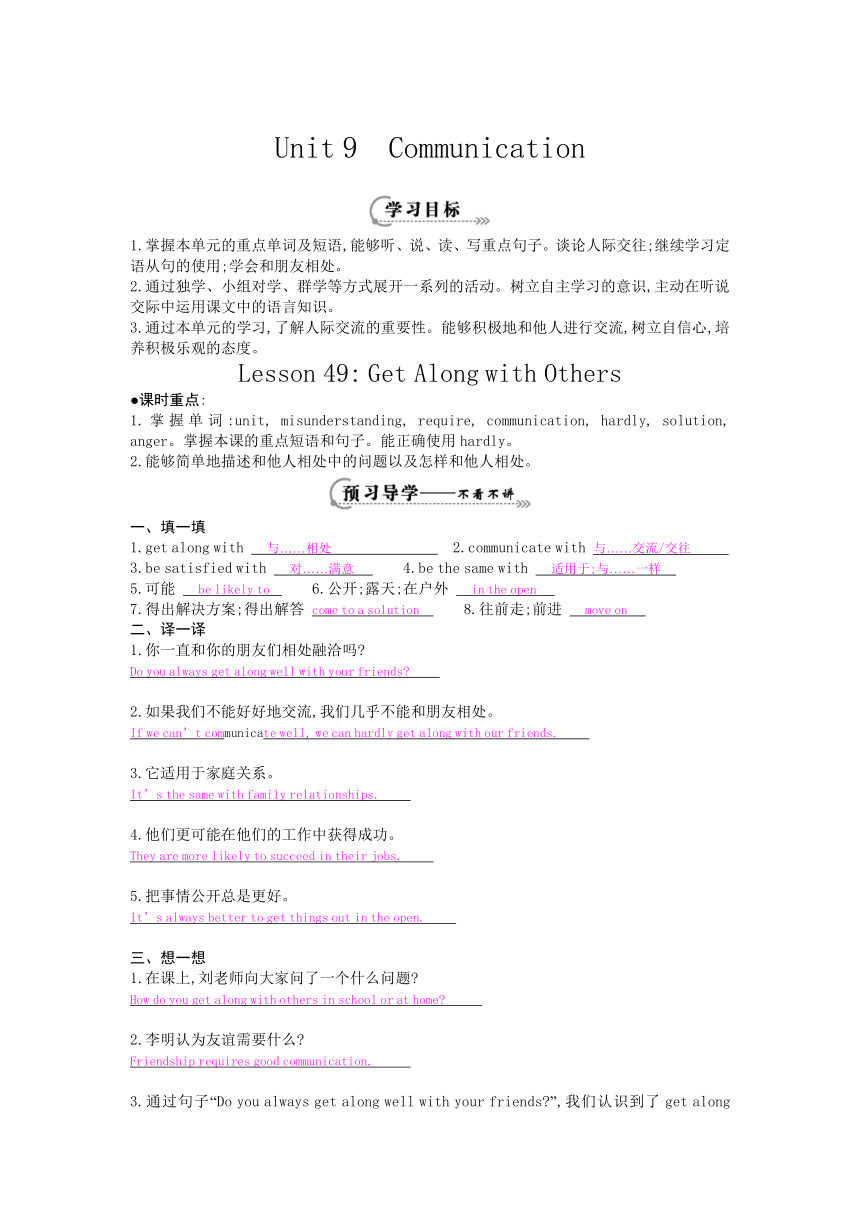Unit 9 Communication Lesson 49 Get Along with Others 导学案
文档属性
| 名称 | Unit 9 Communication Lesson 49 Get Along with Others 导学案 |  | |
| 格式 | zip | ||
| 文件大小 | 52.8KB | ||
| 资源类型 | 教案 | ||
| 版本资源 | 冀教版 | ||
| 科目 | 英语 | ||
| 更新时间 | 2015-05-23 14:04:01 | ||
图片预览

文档简介
Unit 9 Communication
1.掌握本单元的重点单词及短语,能够听、说、读、写重点句子。谈论人际交往;继续学习定语从句的使用;学会和朋友相处。
2.通过独学、小组对学、群学等方式展开一系列的活动。树立自主学习的意识,主动在听说交际中运用课文中的语言知识。
3.通过本单元的学习,了解人际交流的重要性。能够积极地和他人进行交流,树立自信心,培养积极乐观的态度。
Lesson 49: Get Along with Others
●课时重点:
1.掌握单词:unit, misunde ( http: / / www.21cnjy.com )rstanding, require, communication, hardly, solution, anger。掌握本课的重点短语和句子。能正确使用hardly。
2.能够简单地描述和他人相处中的问题以及怎样和他人相处。
一、填一填
1.get along with 与……相处 2.communicate with 与……交流/交往
3.be satisfied with 对……满意 4.be the same with 适用于;与……一样
5.可能 be likely to 6.公开;露天;在户外 in the open
7.得出解决方案;得出解答 come to a solution 8.往前走;前进 move on
二、译一译
1.你一直和你的朋友们相处融洽吗
Do you always get along well with your friends
2.如果我们不能好好地交流,我们几乎不能和朋友相处。
If we can’t communica ( http: / / www.21cnjy.com )te well, we can hardly get along with our friends.
3.它适用于家庭关系。
It’s the same with family relationships.
4.他们更可能在他们的工作中获得成功。
They are more likely to succeed in their jobs.
5.把事情公开总是更好。
It’s always better to get things out in the open.
三、想一想
1.在课上,刘老师向大家问了一个什么问题
How do you get along with others in school or at home
2.李明认为友谊需要什么
Friendship requires good communication.
3.通过句子“Do you always ( http: / / www.21cnjy.com )get along well with your friends ”,我们认识到了get along with的使用。举一反三,你可以用这个短语说一些句子吗
I get along well with my classmates.
活动一
1.阅读课文,完成课文后的第一题。根据课文内容把人物和他们的观点相匹配,并核对答案。
2.两人一组就所匹配的内容进行问答练习。
完成任务所需的语言结构:
A:Who thinks it’s always better to get things out in the open
B:Ms. Liu.
A:Who thinks friendship requires good communication
B:Li Ming.
...
活动二
1.完成课文后的第二题,用课文中短语的正确形式改写句子。
2.完成课文后的第三题,把方框中的形容词转变成副词形式,然后用它们完成句子填空。
3.用所给的形容词及相应的副词进行组句练习,体会形容词和副词使用时的区别。
完成任务所需的语言结构:
It is easy to learn Chinese.
We finished the work easily.
...
活动三
小组活动,完成课文后的第四 ( http: / / www.21cnjy.com )题。关于交流或沟通你有一些什么想法呢 用I think..., I guess..., That’s for sure! That’s true! Good point!等句式把你的一些想法分享给大家,并以短文的形式表现出来。
知识超市
●Friendship requires good communication.友谊需要好的交流。
require 表示“需要”时,后面可 ( http: / / www.21cnjy.com )接动词不定式或者动名词。require to be done / require doing 表示“需要被……”;require后跟带不定式的复合结构,require sb. to do sth.表示“要求某人去做某事”。
communication名词,意为“交流”,其动词形式是communicate。
做一做:单项选择。
(C)1.He required us the work on time.
A.finish B.finished C.to finish D.finishing
(A)2.The library requires , but it’ll have to wait until Sunday.
A.cleaning B.be cleaned C.clean D.being cleaned
●If we can’t comm ( http: / / www.21cnjy.com )unicate well, we can hardly get along with our friends.如果我们不能好好地交流,我们几乎不能和朋友相处。
本句包含了一个if引导的条件状语从句,如果主句是将来时,if引导的条件状语从句用一般现在时表将来。
hardly 副词,意为“几乎不 ( http: / / www.21cnjy.com );几乎没有”, 具有否定意义,相当于almost not, 常与ever, any等词连用;在由hardly构成的反意疑问句中,尾句的疑问式须用肯定式。
做一做:单项选择。
(D)1.He looked at the blackboard but see anything.
A.hard; hard B.hardly; hardly
C.hardly; hard D.hard; hardly
(C)2.If I find his phone number, I you.
A.tell B.told C.will tell D.have told
见《导学测评》P71
1.掌握本单元的重点单词及短语,能够听、说、读、写重点句子。谈论人际交往;继续学习定语从句的使用;学会和朋友相处。
2.通过独学、小组对学、群学等方式展开一系列的活动。树立自主学习的意识,主动在听说交际中运用课文中的语言知识。
3.通过本单元的学习,了解人际交流的重要性。能够积极地和他人进行交流,树立自信心,培养积极乐观的态度。
Lesson 49: Get Along with Others
●课时重点:
1.掌握单词:unit, misunde ( http: / / www.21cnjy.com )rstanding, require, communication, hardly, solution, anger。掌握本课的重点短语和句子。能正确使用hardly。
2.能够简单地描述和他人相处中的问题以及怎样和他人相处。
一、填一填
1.get along with 与……相处 2.communicate with 与……交流/交往
3.be satisfied with 对……满意 4.be the same with 适用于;与……一样
5.可能 be likely to 6.公开;露天;在户外 in the open
7.得出解决方案;得出解答 come to a solution 8.往前走;前进 move on
二、译一译
1.你一直和你的朋友们相处融洽吗
Do you always get along well with your friends
2.如果我们不能好好地交流,我们几乎不能和朋友相处。
If we can’t communica ( http: / / www.21cnjy.com )te well, we can hardly get along with our friends.
3.它适用于家庭关系。
It’s the same with family relationships.
4.他们更可能在他们的工作中获得成功。
They are more likely to succeed in their jobs.
5.把事情公开总是更好。
It’s always better to get things out in the open.
三、想一想
1.在课上,刘老师向大家问了一个什么问题
How do you get along with others in school or at home
2.李明认为友谊需要什么
Friendship requires good communication.
3.通过句子“Do you always ( http: / / www.21cnjy.com )get along well with your friends ”,我们认识到了get along with的使用。举一反三,你可以用这个短语说一些句子吗
I get along well with my classmates.
活动一
1.阅读课文,完成课文后的第一题。根据课文内容把人物和他们的观点相匹配,并核对答案。
2.两人一组就所匹配的内容进行问答练习。
完成任务所需的语言结构:
A:Who thinks it’s always better to get things out in the open
B:Ms. Liu.
A:Who thinks friendship requires good communication
B:Li Ming.
...
活动二
1.完成课文后的第二题,用课文中短语的正确形式改写句子。
2.完成课文后的第三题,把方框中的形容词转变成副词形式,然后用它们完成句子填空。
3.用所给的形容词及相应的副词进行组句练习,体会形容词和副词使用时的区别。
完成任务所需的语言结构:
It is easy to learn Chinese.
We finished the work easily.
...
活动三
小组活动,完成课文后的第四 ( http: / / www.21cnjy.com )题。关于交流或沟通你有一些什么想法呢 用I think..., I guess..., That’s for sure! That’s true! Good point!等句式把你的一些想法分享给大家,并以短文的形式表现出来。
知识超市
●Friendship requires good communication.友谊需要好的交流。
require 表示“需要”时,后面可 ( http: / / www.21cnjy.com )接动词不定式或者动名词。require to be done / require doing 表示“需要被……”;require后跟带不定式的复合结构,require sb. to do sth.表示“要求某人去做某事”。
communication名词,意为“交流”,其动词形式是communicate。
做一做:单项选择。
(C)1.He required us the work on time.
A.finish B.finished C.to finish D.finishing
(A)2.The library requires , but it’ll have to wait until Sunday.
A.cleaning B.be cleaned C.clean D.being cleaned
●If we can’t comm ( http: / / www.21cnjy.com )unicate well, we can hardly get along with our friends.如果我们不能好好地交流,我们几乎不能和朋友相处。
本句包含了一个if引导的条件状语从句,如果主句是将来时,if引导的条件状语从句用一般现在时表将来。
hardly 副词,意为“几乎不 ( http: / / www.21cnjy.com );几乎没有”, 具有否定意义,相当于almost not, 常与ever, any等词连用;在由hardly构成的反意疑问句中,尾句的疑问式须用肯定式。
做一做:单项选择。
(D)1.He looked at the blackboard but see anything.
A.hard; hard B.hardly; hardly
C.hardly; hard D.hard; hardly
(C)2.If I find his phone number, I you.
A.tell B.told C.will tell D.have told
见《导学测评》P71
同课章节目录
- Unit 7 Work for Peace
- Lesson 37 Don't Fight!
- Lesson 38 Making School a Better Place
- Lesson 39 The Dove and the Olive Branch
- Lesson 40 The UN—Power of Words
- Lesson 41 Jenny's Good Advice
- Lesson 42 Peace at Last
- Unit Review
- Unit 8 Culture Shapes Us
- Lesson 43 A Visit to Chinatown
- Lesson 44 Popular Sayings
- Lesson 45 Different Manners
- Lesson 46 Home to Many Cultures
- Lesson 47 Good Manners
- Lesson 48 Supper with the Bradshaws
- Unit Review
- Unit 9 Communication
- Lesson 49 Get Along with Others
- Lesson 50 Tips for Good Communication
- Lesson 51 What Could Be Wrong?
- Lesson 52 The Power of a Smile
- Lesson 53 Working in Groups
- Lesson 54 How Embarrassing!
- Unit Review
- Unit 10 Get Ready for the Future
- Lesson 55 Look into the Future
- Lesson 56 Manage Your Time
- Lesson 57 Best Wishes
- Lesson 58 Ms.Liu's Speech
- Lesson 59 Keep Your Choices Open
- Lesson 60 Get a Good Education
- Unit Review
